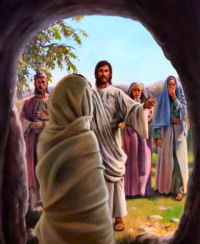Have you ever seen a seed germinate? While it is in the soil, the skin encasing it splits open. Next, the seed itself splits in two, and the stem and root unfurl. Gradually, the seed grows smaller as it nourishes the new plant. Eventually, the seed disappears altogether. If you were to look at the plant after a while, you probably wouldn’t be able to tell what the seed looked like.
What a wonderful image this is of the spiritual life! Like a patient farmer, God is always planting seeds in our hearts, waiting for them to “die” so that they can bear fruit. Each season has its own seeds that need to die—parts of us that need to break open so that new life can come forth. As children, we may be bearing the fruit of obedience and trust.
As young married couples, we may be learning to pour our lives out as we start a new family. And as seasoned adults, our fruit may be that of more active involvement in our community or church.
Again, like a wise gardener, only God knows which seeds need to sprout for each season. It’s no use trying to double guess him. And there’s no need. After all, he knows what he is doing!
Try something different in your prayer today. Look back over your life, and try to identify times when a “seed” had to die so that God could bring something new into your life. Ask yourself: “Well, I survived, didn’t I? And I’m better off for having gone through it, aren’t I?”
Now, having reviewed your past, see if there is something that God wants to do in your present. He is never finished with us! There’s always more that he wants to give us—if only we will let him bring life out of death!
“Lord, I want to bear fruit for your kingdom! Help me to shed my comfortable shell so that I can grow in ways even I can’t imagine!”
Questions for Reflection or Group Discussion
(Jeremiah 31:31-34; Psalm 51:3-4,12-15; Hebrews 5:7-9; John 12:20-33)
1. In the first reading, the Lord promises a new covenant that is much different than the old covenant. It will not be merely a set of external rules and commandments; it will now be written in our hearts. The promise is that we shall actually know the Lord in a personal and intimate way, not just know about him. Why is this now possible for us? What is the difference between a “knowing about” relationship with the Lord and a personal relationship of “knowing” him and “experiencing” his great love? How would you characterize your relationship with the Lord? How can you deepen this relationship?
2. The responsorial Psalm is King David’s great prayer of repentance after he had committed serious sin. How does David’s reaction, reflected in Psalm 51, compare to your reaction when faced with sin in your life?
3. In the second reading, we read that Jesus “learned obedience from what he suffered.” What is your reaction to suffering in your life? In what ways has it caused you to grow closer to Jesus and deepened your faith and dependence on him? In what ways has it sometimes caused you to run or try to escape from it, or react in confusion or anger? What steps can be taken to minimize this latter reaction?
4. In the Gospel reading, Jesus continues to focus with increasing clarity on his coming passion and death, the “hour” when redemption will be accomplished by his obedience to his Father and the shedding of his blood. Jesus also says that: “Whoever loves his life loses it, and whoever hates his life in this world will preserve it for eternal life. Whoever serves me must follow me … The Father will honor whoever serves me.” Can you give an example from your life when obedience to God caused persecution or suffering, but yet you were able to see God work a mighty “good” in your or someone else’s life? How were you able to maintain an inner peace, knowing you were “following” Jesus and his will for you?
5. In addition to encouraging us to review our past experiences, the meditation also encourages us to “see if there is something that God wants to do in your present.” With Good Friday and Easter fast approaching, what additional steps can you take in the remaining days of Lent to cooperate with the Lord in order to “bring life out of death”?
6. Take some time now to pray and ask the Lord for the grace to grow closer to him and bear fruit for his kingdom. Use the prayer at the end of the meditation as the starting point.

